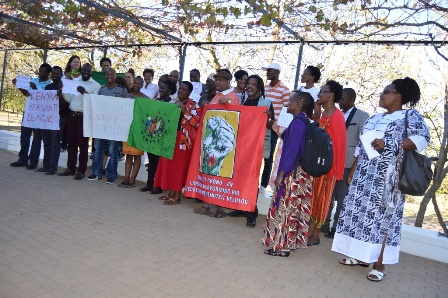We, the people, are right holders that shall hold the states accountable

(Cape Town, April 18, 2017) Today, La Via Campesina Southern and Eastern Africa (LVC SEAf) began the first of a 3-day long consultations on peasant rights UN declaration. Delegates from African, Asian and European countries discussed the building of capacities to understand the UN process and to collectively prepare a report on violations peasant rights.
In his opening remarks, the convener of the Food Sovereignty Campaign Ruben Fortuin said they hope the meeting will contribute to greater awareness of and strengthen, protect and enhance the rights peasants and other people working in rural areas within the region.
According to Veronica Sophu Chairperson MVIWATA (Tanzania network of small scale farmers groups) and LVC SEAf region coordination commission member, “We hope to not only strengthen the lobby and advocacy thinking and efforts to make sure the Declaration is adopted. We also hope to start developing strategic actions to ensure its implementation.”
In agrarian struggles, access to land, water and other natural resources are common struggles. And those who defend such struggles are often criminalised.
African seed systems are increasingly the target of transnational companies. Most small scale farmer-saved seeds are often replaced by commercial and GMO seeds. These are often not adapted to local climates and are failing under unfavourable climate changes.
Mining companies want to exploit land that peasants are producing on. This often means the relocation and resettlement of peasants. States have obligations including those to protect the peasants and their communities against abuses of private actors. Thus, peasants and other people working in rural areas are right holders that shall hold the states accountable.
Women and youth are often most affected. Rights of peasant women and other women working in rural areas need to be addressed and affirmative measures that make visible their situation and correct historical, systematic and intersectional discrimination. Youth population faces a major discrimination in rural areas causing economic displacements. Gender issues have been addressed in the workshop as one of the principal elements that need to be addressed by the process in Geneva and in our own local, national and regional level.
Redressing all these struggles is difficult for most peasants. According to delegates in the workshop, access to justice is expensive and mostly inaccessible for peasants. In most countries in the region justice is for the powerful and not the peasants.
“Why should we be interested in having a peasant rights instrument? We want to change the paradigm. We need to move from development policies-centered approach, to one where people are at its centre,” says Ana Maria Suarez Franco (FIAN).
If approved, the UN Declaration on peasant’s rights and other peoples working in rural areas will serve as a legal tool for all rural people. The document will legitimatize and strengthen their struggles, which currently are not adequately recognised, respected and enforced.
The process of the Peasant Rights Declaration presents bigger political challenges. There are two lines of work for the declaration: The first is to have the declaration adopted with broad support. The second is to make it a reality on ground level.
